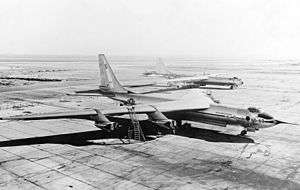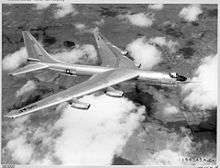Convair YB-60
The Convair YB-60 was an American prototype bomber aircraft for the United States Air Force, canceled on 14 August 1952.
| YB-60 | |
|---|---|
 | |
| YB-60 prototype, Convair B-36F in the background | |
| Role | Strategic bomber |
| Manufacturer | Convair |
| First flight | 18 April 1952 |
| Status | Canceled 14 August 1952 |
| Number built | 1 complete, 1 partial |
| Program cost | US$14.3 million for program[1] |
| Developed from | Convair B-36 |
Design and development
On 25 August 1950, Convair issued a formal proposal for a swept-winged version of the B-36 with all-jet propulsion. The United States Air Force was sufficiently interested that on 15 March 1951, it authorized Convair to convert two B-36Fs (49-2676 and 49-2684) as B-36Gs. Since the aircraft was so radically different from the existing B-36, the designation was soon changed to YB-60.
The YB-60 had 72% parts commonality with its piston-engined predecessor. The fuselages of the two aircraft were largely identical, although the YB-60 had a longer, pointed nose with a needle-like instrument probe instead of the B-36's rounded nose; its tail surfaces were swept to match the wings and a wedge-shaped insert added at the wing root. The swept wings also used many B-36 parts.
The YB-60's unofficial competitor for an Air Force contract was Boeing's B-52 Stratofortress. Convair's proposal was substantially cheaper than Boeing's, since it involved modifying an existing design rather than starting from scratch. Like the B-52, it was powered by eight Pratt & Whitney J57-P-3 turbojets mounted in pairs in four pods suspended below the wing.
Instead of the B-36's crew of 15, the YB-60's crew numbered 10. Production B-60s were to have defensive armament similar to those of the B-36.
Convair YB-60 serial number 49-2676 made its maiden flight on 18 April 1952, piloted by Beryl Erickson. The Boeing YB-52 beat the Convair aircraft into the air by three days. The YB-60 was approximately 100 mph (160 km/h) slower than the YB-52 and also had severe handling problems. It did carry a heavier bomb load — 72,000 lb (33,000 kg) against 43,000 lb (20,000 kg) for the YB-52 — but the Air Force did not see the need for the extra capacity, given the YB-60's other drawbacks. Later, "big belly" modifications increased the B-52's bomb load to 60,000 pounds (27,000 kg).
The flight test programs were canceled on 20 January 1953, with 66 flying hours accumulated. A second prototype was never completed: the airframe was built, but it was not fitted with engines or much equipment. Since Convair completed their prototype contract satisfactorily, both YB-60s were formally accepted by the Air Force in 1954. The operational aircraft never flew again, and both airframes were scrapped by July.
Specifications (YB-60)

Data from
General characteristics
- Crew: 5 (two pilots, navigator, bombardier/radio operator, radio operator/tail gunner)
- Length: 171 ft (52 m)
- Wingspan: 206 ft (63 m)
- Height: 60 ft 6 in (18.44 m)
- Wing area: 5,239 sq ft (486.7 m2)
- Airfoil: root: NACA 63(420)-422 Mod.; tip: NACA 63(420)-517[2]
- Empty weight: 1,530–16 lb (694–7 kg)
- Gross weight: 160,000 lb (72,575 kg)
- Max takeoff weight: 300,000 lb (136,078 kg)
- Powerplant: 8 × Pratt & Whitney J57-P-3 turbojet engines, 8,700 lbf (39 kN) thrust each
Performance
- Maximum speed: 508 mph (818 km/h, 441 kn) at 29,250 ft (8,915 m)
- Stall speed: 115 mph (185 km/h, 100 kn)
- Combat range: 2,920 mi (4,700 km, 2,540 nmi)
- Ferry range: 8,000 mi (13,000 km, 7,000 nmi)
- Service ceiling: 53,300 ft (16,200 m)
- Rate of climb: 1,060 ft/min (5.4 m/s)
- Wing loading: 31 lb/sq ft (150 kg/m2)
- Thrust/weight: 0.44
Armament
See also
Related development
- Convair B-36
Aircraft of comparable role, configuration and era
Related lists
References
- Knaack, Marcelle Size (1988). Post-World War II bombers, 1945-1973. Office of Air Force History. ISBN 0-16-002260-6.
- Lednicer, David. "The Incomplete Guide to Airfoil Usage". m-selig.ae.illinois.edu. Retrieved 16 April 2019.
- Jacobsen, Meyers K. and Wagner, Ray. B-36 in Action (Aircraft in Action No.42). Carrollton, TX: Squadron/Signal Publications, Inc., 1980. ISBN 0-89747-101-6.
- Jones, L.S. U.S. Bombers, B-1 1928 to B-1 1980s. Fallbrook, CA: Aero Publishers, Inc., 1962 (second edition 1974). ISBN 0-8168-9126-5.
External links
| Wikimedia Commons has media related to Convair YB-60. |
- Convair YB-60
- "Heavies of the U.S. and Russian air forces", Popular Mechanics, June 1952, p. 93.